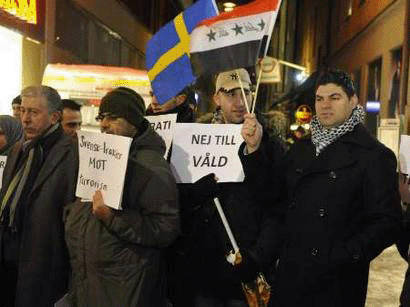
Swedish-Iraqi immigrants protest in central Stockholm, where a car bomb exploded two days ago December 13, 2010. The placard on left reads, “Swedish Iraqis against terrorism”. REUTERS/Bertil Ericson
The recent bomb attempt in Sweden has been linked to an Iraqi who grew up in Sweden. Not much has been written about the influx of Iraqis to Sweden, whose open door policy in the past has led to it being a haven for refugees. However, one of my students, Sarah Skiold-Hanlin conducted an ethnographic project on Swedish reactions to the Iraqi community in the summer of 2008. Her research paper, an Honor’s Thesis in the Department of Anthropology at Hofstra, is available online and I recommend it for anyone wanting more information on the subject of Iraqis in Sweden.
I attach Sarah’s introduction below, but encourage you to read her entire paper:
“One place where many Iraqis have found refuge from the war is Sweden,†stated Renee Montagne, the host of NPR’s Morning Edition. This was her opening line as she introduced the news story titled: Sweden Begins Sending Iraqi Refugees Home. The story aired March 25, 2008. Renee goes on to explain how the “many Iraqis†numbered somewhere in the range of 20,000. A momentary flash of elation followed this opening as my mind began turning over the meaning, estimating its possible weight. Perhaps Sweden, a nation with which I have close family ties, could help rectify the political actions of my country of birth. But like trying to dam the Mississippi River with a box of pop sickle sticks and a bottle of Elmer’s Glue, the flow of refugees fleeing the war in Iraq is far to numerous for one small Scandinavian country to hold. Renee’s voice fervently interjected as she continued washing away my melodic dreams of relief and solution to the persistent humanitarian crisis plaguing so many civilians. “The Swedish government is stopping that flow of Iraqi refugees and sending some back home against their will,†she reported.
The larger story of Iraqi immigrants was handed off to reporter Jerome Socolovsky in Flen, Sweden. Reporting from a Swedish language-learning center filled with “Afghans, Kurds, Iraqis, Somalis and others from the world’s war zones,†he portrays a hopeful beginning for asylum seekers getting a head start on the assimilation process. He interviews one of the students who breaks down as he is forced to relive a horrific bombing that nearly took his son’s life. Though he is now in Sweden, his remaining family resides in Iraq. Yet Sweden is not all that welcoming. Socolovsky goes on to explain that in the recent past this interviewee’s family may have had a promising chance at being granted asylum if it were not for the October 2007 ruling made by Sweden’s Migration Appeals Court (Larson 2008) This ruling declared that there is “no internal armed conflict in Iraq.†Such a ruling made it much tougher for refugees to seek successful asylum under the new restrictive guidelines.
The story touched on the problematic situation from the standpoint of Swedish nationals, government officials, immigrants and asylum hopefuls just the same. It offered no solution to the situation. Though the beginning seemed sympathetic toward the plight of the refugees, its elaboration on the conflict’s entirety did not point any fingers specifically, not at the Swedish government nor its citizens. Nevertheless, the five minutes and fourteen seconds it took to present this kaleidoscope of challenges grabbed my attention as new problems presented themselves at each turn. This was something I wanted to investigate for myself.
Sweden has long been a country that I have idealized. Growing up in the United States as a critical participant has placed Sweden, the country most prominent in my heritage, strides ahead. It has been my opinion that the ‘American way’ and its ostensible refusal to care for its own citizens as well as its ‘elephant in the room’ equality quandary have made it a nation of ‘might makes right’ rather than freedom. My mother, born and raised in southern Sweden, frequented her native land to visit her father, my grandfather. On these trips she would take my brother and I along and introduce us to the wondrous ease of Swedish life. The faux infallible solidarity of the Swedish people and their government’s unending generosity (in reference to its social welfare system and ability to maintain a phenomenal standard of living) became the measuring stick with which all other countries would have to compare.
I had naively overlooked the fact that no country, government, people or individual is without folly. After hearing this story, I began to take a second and more grounded look at the country I admired most. The ability of Sweden to handle the new influx of Iraqi refugees and successfully integrate them into their society is the topic I have chosen to apply my time and efforts to.